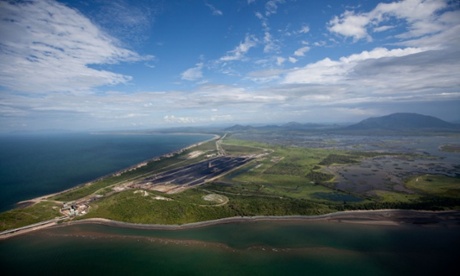Great Barrier Reef impact from dredging could cost ‘as much as $1bn’
The amount of money needed to “offset” the impact of a dredging project on the Great Barrier Reef could be as much as $1bn – which is $998m more than the project developer has suggested.
Documents obtained under freedom of information reveal huge uncertainty over the investment needed to maintain water quality following dredging to expand the Abbot Point port, north of Bowen in Queensland.
In approving the development, which will allow for a greater volume of shipped coal exports, environment minister Greg Hunt stipulated there must be a 150% net benefit in water quality after the dredging.
Several experts, including those from the United Nations, have questioned whether this is viable, with critics claiming that digging up seabed and dumping it within the Great Barrier Reef marine park will smother coral with sediment and kill off marine life.
Internal emails from the Great Barrier Reef Marine Park Authority show this task, and its cost, is open to question.
“GBRMPA has done some preliminary cost estimates for water quality offsets and assess that the cost of delivering a genuine net benefit would [be from] $200m to over $1bn depending on assumptions,” one document from June 2013 states.
“Without any indication as to what the proponent or the department view as reasonable, determining whether any proposed offsets are practical and provide a proven net benefit will be problematic.”
These emails contain a warning, revealed earlier this year, that the entire proposal to dump 3m cubic metres of dredged seabed into the marine park is problematic in itself.
The disparity in the amount of money needed to offset sediment dumped into the marine park is revealed in further GBRMPA correspondence from January 2014.
Minutes from a meeting show that North Queensland Bulk Ports Corporation, the proponents of the Abbot Point expansion, estimated that $2m would be needed to offset the dumped sediment.
“Our assessments are more like 100m, how do you manage that difference?” the minutes state.
This discrepancy means that the two parties were at least $98m, or as much as $998m, apart in their estimates of the offset cost.
A spokeswoman for NQBP said that this wasn’t the case as costs were still being worked through.
“Any suggestion that NQBP is only allocating $2m for water quality improvement work is not correct,” she said. “The exact details and costs are still being worked through with the department so at this stage there is no accurate figure which can be provided either by NQBP, the Department of Environment or GBRMPA.
“It is also important to understand that dredging has not yet occurred and that there are a number of conditions which will need to be met to ensure that impacts are avoided and mitigated.”
Previous freedom of information documents have shown concern from the Australian Institute of Marine Science that dumped sediment will travel further than previously thought, potentially endangering the reef’s coral and seagrass.
Jeremy Tager, a campaigner at North Queensland Conservation Council, which obtained the documents, said the $2m cited by NQBP is “not nearly enough” to ensure water quality is improved.
“No one has figured out how this will work, or the cost of it, or how to measure it,” he said. “It’s all up in the air. Offsets are problematic anyway, due to the failure to monitor and oversee them.
“The worry is that the federal government will have to come in and pay for any shortfall with taxpayer money. There is nothing in the approval that states the proponent must pay. The government needs to come out and say that no public funds will be used for these offsets.”
North Queensland Conservation Council is currently engaged in a court battle to stop the Abbot Point expansion.
A spokeswoman from the GBRMPA said: “Based on the approval conditions set out by the federal environment minister, North Queensland Bulk Ports is required to develop an offsets plan for the Burdekin and Don catchments.
“Once the department of the environment receives the offsets plan, the Great Barrier Reef Marine Park Authority will review its content and provide advice.”
Greg Hunt’s office was contacted for comment on the documents.
Meanwhile, the project developers are still attempting to find a site to dump the spoil, after it was determined that the original location, 24km out from Abbot Point, was unsuitable. The project was approved despite this uncertainty, with Hunt having to sign off on the new location.
Source: Theguadian



Comments